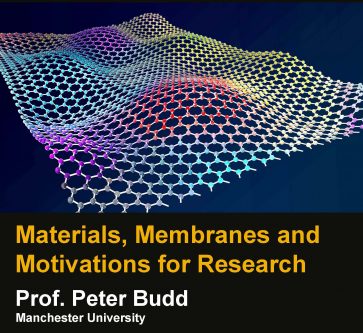New and improved materials are required to help us achieve global goals for sustainable development in areas such as clean water, affordable and clean energy, and climate action. A particular need is the ability to separate liquid mixtures (e.g., to remove salts and other impurities from water, or to concentrate up biofuels) and gaseous mixtures (e.g. to capture CO2 from flue gases). Membranes – thin films that act as selective barriers – offer energy-efficient alternatives to traditional separation processes such as distillation. Research at Manchester has given rise to two classes of material with potential for use in membranes for molecular separations: 2D materials such as graphene, and the class of high free volume polymers referred to as “Polymers of Intrinsic Microporosity” (PIMs). As well as considering the development and applications of these materials, we shall explore the underlying motivations for undertaking scientific research. These include the fun of science, that science gives answers to interesting questions, and that science is useful. For the scientist who holds a theistic worldview, an additional motivation is that science helps us learn something about God.





